
Gordian Quest is a new Steam Early Access game from developer Mixed Realms. Joining the multitude of indie forays into card-based combat, the game promises an epic rogue-lite that combines deck-building, tactical combat and strategic decision-making in a fantasy setting. It sounds like pretty promising stuff, but as with many Early Access titles, the question isn’t whether it’s a good concept, but rather whether the playable game is proof of that concept.
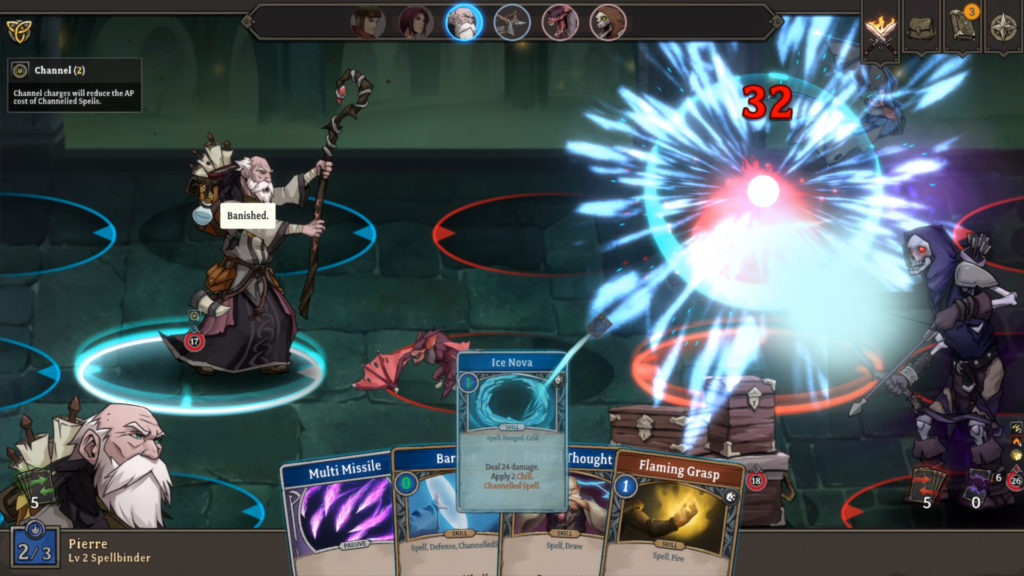
There’s a voiced story introduction for Gordian Quest, and it’s surprisingly generic and overacted, coming off more like a YouTube trailer than an actual introduction. Honestly, the intro is so bad it turned me off from the actual story a bit, which is more interesting than you might be led to believe. The first act (of a planned four) is the only one available at the moment and it leaves you to attempt to deal with the undead attacking a medium-sized village and balloons into full fantasy epic quest territory. As the only capable people in the area, it falls to you and your companion (you pick both your class and a companion from a roster of six) to save the town, since no one else can. There’s some flavor to the backstory and its moderately interesting, but the entire plot has the feel of ‘generic fantasy story – insert names’ to it. Fortunately, the focus is more on the gameplay and things are a bit better there.
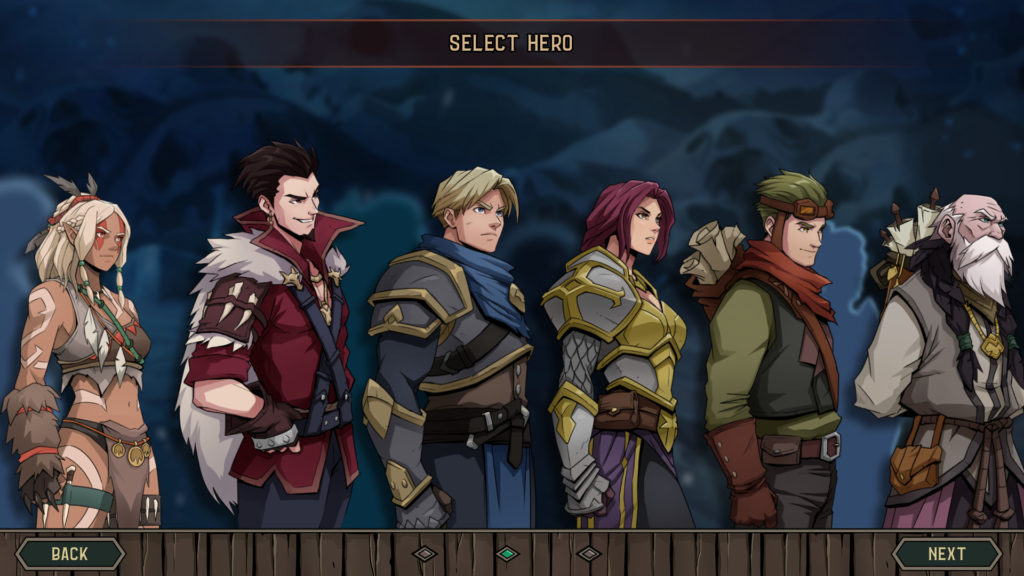
Gordian Quest, as mentioned, mixes several genres to create a more rounded game experience. Deck-building for combat, decision-making, and RPG elements all coalesce here to form the full game. You choose locations from a map and your characters travel to them, encountering what lies at each point and fulfilling requests and side-quests. Initially, with only two characters, things are a bit hairy and you’ll be surprised at how vicious the enemies can be. For the purposes of this review, classic mode was chosen and the difficulty wasn’t set too high, but it was still a constant struggle to survive for the first few sections of the playthrough.
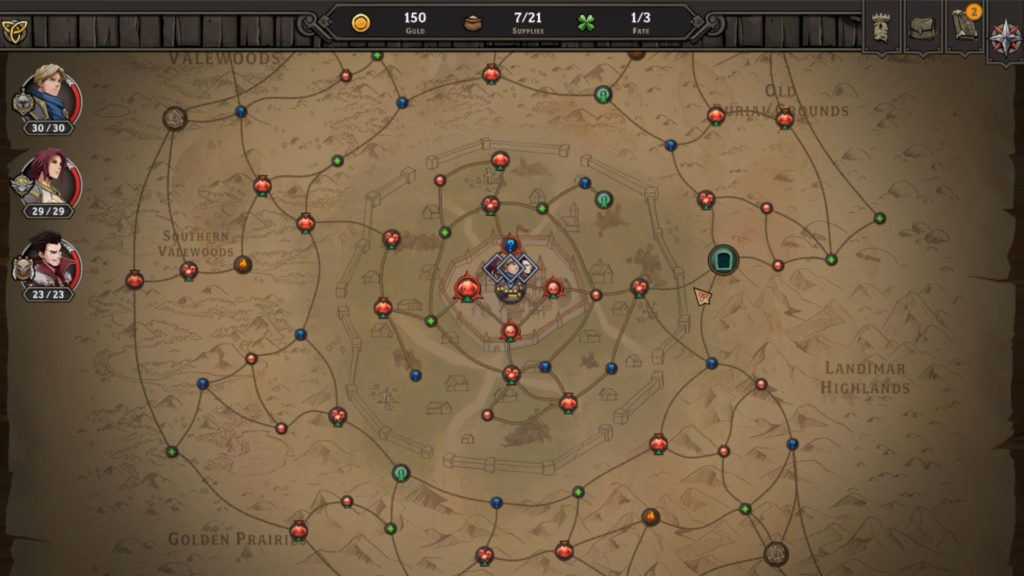
During combat, you have a hand of cards for each playable character, and they’re random from a deck based on your equipment loadout, much like Magic: The Gathering. Your battle arena is a 4 x 6 grid of circles and enemies appear on the right. You have limited action points per turn which are used equally to pay card prices and move. You’ll definitely be restricting movement at first because with only 3 points per character, you’re not going much of anywhere. As the game goes on, there are ways to pay costs more easily, but the first 10 or so combats will be down to the wire. Use your points, end your turn, then the next character repeats the process. After you’re done, the enemy pummels you mercilessly and you respond. Combat cards have a wide variety of abilities and uses. For this playthrough, a ranger and a mage were used, maximizing ranged potential and limiting close quarters combat. Luckily, Gordian Quest has a forgiving range system, and even though you can barely move from one turn to the next, you can hit enemies with a sword thrust from several circles away, a massive departure from most tactical combat systems. In fact, with a ranger, many cards actually reward you for distance attacks, which works out very well once you learn how all the cards work.
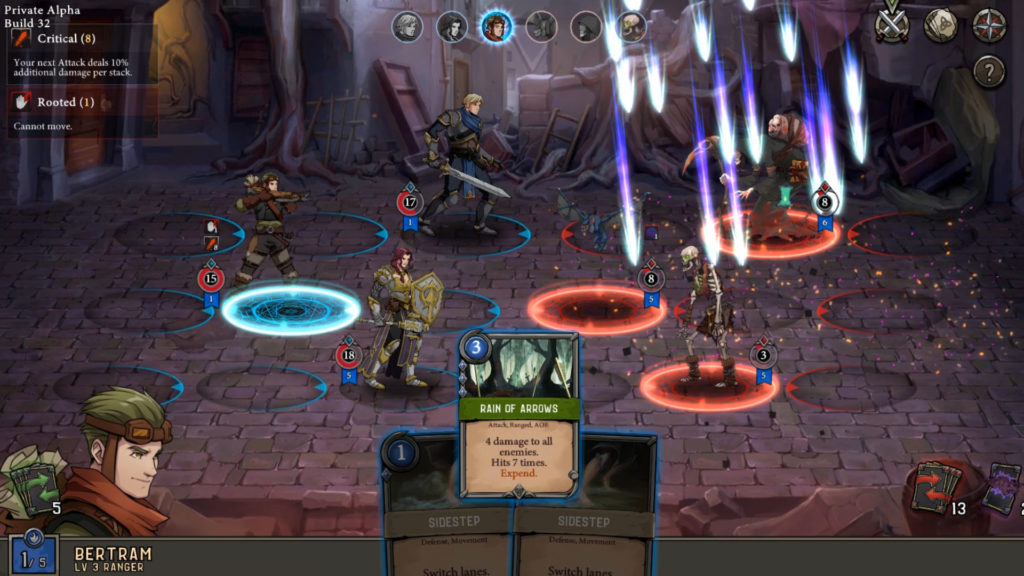
Combat is a trial and error thing until you learn how the fights flow, but it’s fairly well-designed. The one downside is fatalities. Die in the game and you have to pay 100 gold per person to be resurrected, but you only get 10 or 15 gold per battle. Healing is free at the church if you survive, but die and you’ll be broke, fast. And that’s on an easier mode. On harder levels of difficulty, expect Darkest Dungeon level trauma such as perma-death all around and a slim chance for survival with no margin for error. Gordian Quest is a tough game on harder difficulties and making mistakes is costly. Even equipping the wrong items can be a problem in combat, cluttering up your card inventory and making you drawn a bunch of useless extra cards. Picking your deck loadout would be easier, but that’s not how things work here. The game forces you to pay attention to what you utilize lest you be trapped in a fight and die solely because you drew too many of the wrong cards. This can be a very difficult game and unless you’ve chosen easy mode, you’ll walk away bruised and brutalized.
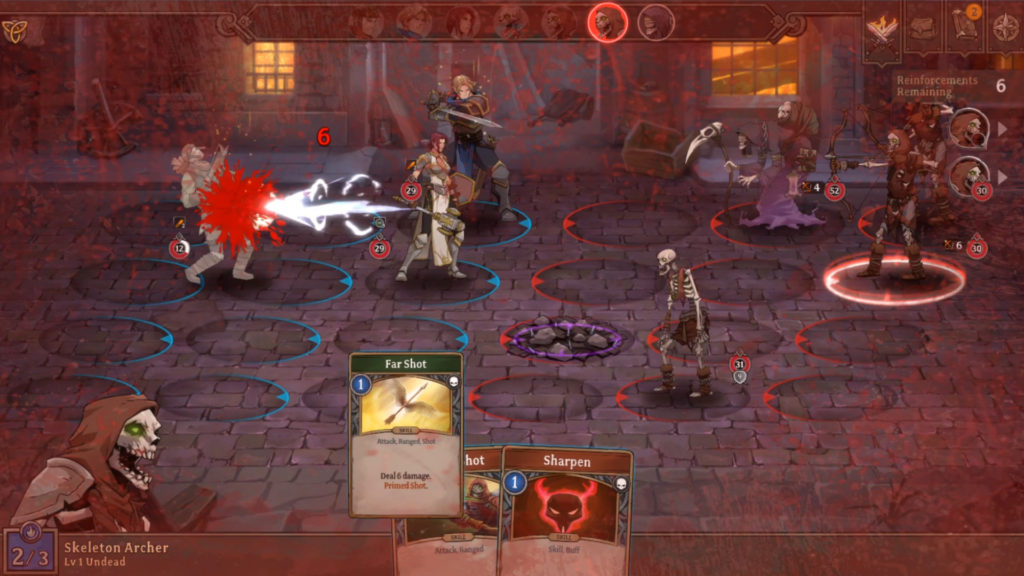
There’s more going on in Gordian Quest than combat though. The strategic decision-making is something that’s only now getting more popular in indie games, and it’s a great way to shake things up. For those of you that are old enough, think Choose Your Own Adventure segments. You select a node to travel to, and you’re presented with a choice. Sometimes that choice has effects on the whole dungeon, sometimes it just hurts you if you fail a Dungeons & Dragons style saving throw with a virtual D20. Either way, story elements are presented to you in much the same way an Endless Quest book might, showing the consequences of your actions and occasionally even starting an impromptu combat segment. It’s a fun way to make things more interesting and it’s quite well implemented overall. Games like Omen Exito: Plague (which we reviewed here), Curious Expedition (also reviewed recently here), and other relatively recent releases have used similar mechanics and it seems to be a good way to mesh storyline with interactivity.

The decision-making graphics somewhat resemble reading an old book, making the comparison to Choose Your Own Adventure more than apt. Visually, the style is slightly cartoonish, consistent with the character designs and general theme of the game. It’s obvious that this is an indie title from the graphics, but that’s not a slight. The character designs are solid, the ambience is good, and the enemies are more than sufficiently varied, making for a nice looking game. It’s not as dark as Darkest Dungeon, but the first act feels foreboding enough to carry the story. Even the card art and the way that status effects are portrayed on your hand while they affect you is well done. It’s a consistent visual experience throughout Gordian Quest that’s noticeably reminiscent of the current generation of Dungeons & Dragons comic books and one that’s altogether enjoyable.

The majesty of the soundtrack was a surprise as well. This is an excellent fantasy orchestral experience that really outdoes itself. Reminiscent of a Jeremy Soule composition, the music accompanies gameplay well and would likely be worth downloading. Songs convey the urgency and desperation of your situation in every battle and fade in to the sound effects in just the right way. A fair number of indie games these days have exceptional soundtracks and Gordian Quest is certainly in that category, even if the songs could be just a hair longer here and there.
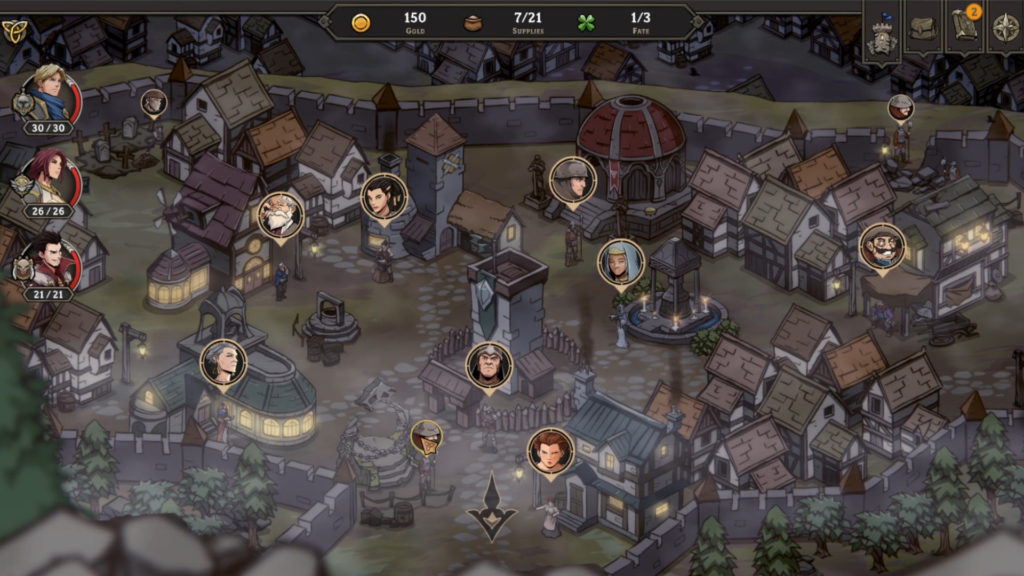
The developers over at Mixed Realms have stated that in the finished product, Gordian Quest will consist of four acts and have somewhere between 16 and 22 playable characters and thousands of cards. Currently the game sits at 6 playable characters and around 500 cards. There’s a lot more to the minutia of the game as well, including crafting to modify items, a skill grid system for characters, hundreds of items, and an assortment of other options available. It’s easy to see that the finished product here will have a lot of potential and the game is on an excellent path to that end. The story definitely needs some fine tuning and a more engaging presentation to keep players immersed however. That’s the thread that ties a decent game together and makes it into a great game, and only time will tell if Gordian Quest manages to shape into something notable or fall into obscurity. At the moment, things are looking good though, and the $20 price point for around 6 hours of gameplay in the first act assuming that content continues to be released and meets the same calibre. There are some lofty ambitions here and hopefully they’ll be achieved as act one is a solid foundation!
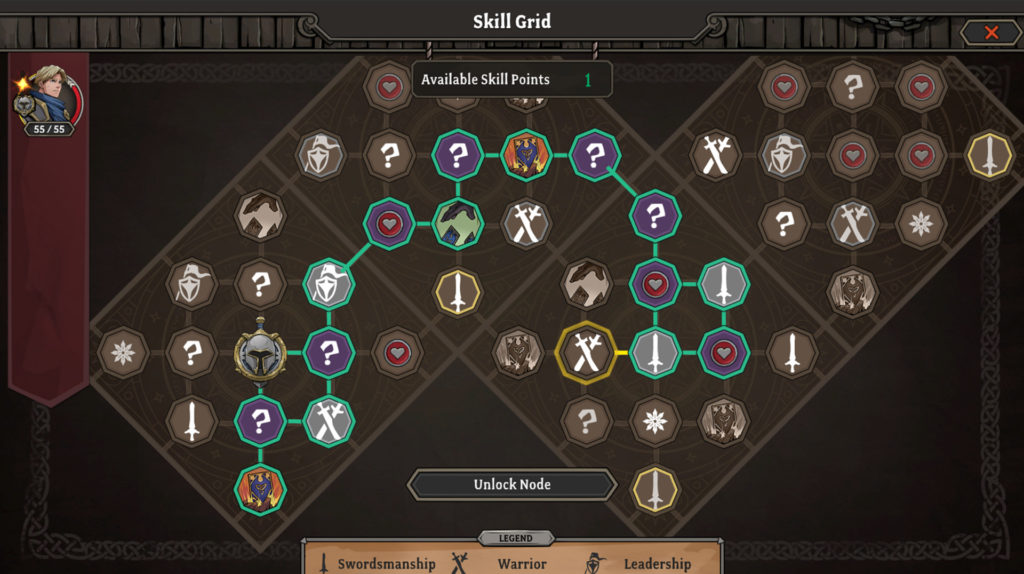
This review is based on a digital copy of Gordian Quest for Steam provided by the publisher. It was played on a gaming PC using an I7-8700K with 16 GB of DDR4-3000 RAM, and an Asus GeForce GTX 1080 ROG Strix graphics card. There were a few technical issues during gameplay with this build of the game. Gordian Quest crashed several times in the middle of combat and there was an update released before the completion of this review that seems to have stabilized it a bit. Two of those crashes were with the Unity engine. Be aware that this is still an Early Access game and won’t necessarily run perfectly on every system. It is also not compatible with standard USB controllers such as the Xbox One Controller at this time. Gordian Quest is exclusive to Steam at this time, but would be an excellent addition to the Switch library, especially with touchscreen controls (HINT, HINT, Mixed Realms)!

